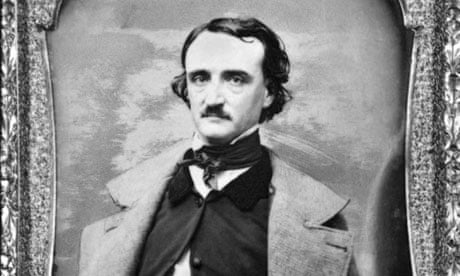The lovely bit of Odilon Redon, on the cover - "the eye, like a strange balloon, bears towards infinity" - does honour to Poe's symbolist credentials; how nice to see him among his friends. But then the French always got on with Poe better - relished the style Baudelaire called "at once pure and strange," and filtered its rhetorical stylisation, its lyric abstractions through a language with rhetoric built in to it and a more succinct way with abstractions than English has. So Poe, like much writing in the Gothic mode, sounds infinitely more respectable in a French translation.
Even after all these years, the heavy Wasp tradition of criticism has difficulty digesting Poe. It's the rhetoric they can't take. Couldn't take it in Milton, could they? Far less in the Virginian dement, with his atrocious paraphernalia of ghouls and sheeted dead, miraculous voyages, marvellous technology and perpetual unease.
The heavies still seem to find Baudelaire's enthusiasm for Poe, and Mallarmé's, and Valéry's, an inscrutable Gallic aberration, like having your cheese before your pudding. Surely those French chaps can't be serious ? Surely they're putting us on ? We all know how pretentious the French are. . . An avatar of classical modernism on the Continent, the inspiration for innumerable horror comics at home. Poor Poe. The angel of irony still directs that black-masted barque.
Harold Beaver has found another flag for the black-masted barque to sail under into some kind of harbour of academic respectability; that of science fiction. Though it was the French who first made this particular connection - Jules Verne called Poe: "le createur du roman merveilleux scientifique."
"Poe's detailed and mathematical science intensifies this imaginative fusion with the occult," says Beaver in an introduction that takes the Baudelairean line on Poe, and quite right, too. This collection includes Poe's self-styled "prose-poem," Eureka, subtitled "an essay on the material and spiritual universe" - which demonstrates how hard imaginative artists find it to take science seriously as science.
There's a commentary of positively Borgesian erudition on the stories and a select chronology of post-Newtonian science from 1748-1848, to show that Poe kept up with things. He's already supposed to have invented the detective story, and now Poe is assigned responsibility for a whole new literary sub-genre. He'll get into the Great Tradition somehow. Founding fathers are always respectable.
The Science fiction of Edgar Allan Poe - collected and edited by Harold Beaver (Penguin English Library, 90p)



Comments (…)
Sign in or create your Guardian account to join the discussion